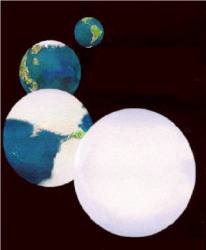 Planetary geologists propose that our planet once had periods of extreme global freezing nicknamed the “Snowball Earth” eras. During these periods, they supposed, the planet’s temperatures went so low that the oceans froze, and everything was covered in ice. Most sunlight was reflected back into space, perpetuating the icy period.
Planetary geologists propose that our planet once had periods of extreme global freezing nicknamed the “Snowball Earth” eras. During these periods, they supposed, the planet’s temperatures went so low that the oceans froze, and everything was covered in ice. Most sunlight was reflected back into space, perpetuating the icy period.
But new evidence disputes this. By analyzing glacial sedimentary rocks in Oman, researchers have discovered evidence of hot-cold cycles roughly 850-544 million years ago – during the period when the Earth should have been in a deep freeze. Instead of being completely frozen over, with solid oceans, it appears that the Earth still had warm spots with open oceans; places where geologic processes could happen.
A global freeze would have been devastating to life. Without oceans there would be no evapouration and no weather system. Icy surfaces would have reflected much of the sunlight, keeping the Earth permanently cold. It appears that we got close, with the northern and southern icecaps nearly reaching one another. But we were fortunate to avoid that disaster.
Original Source: Imperial College News Release
